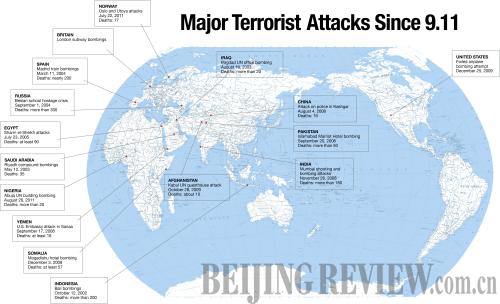|
 |
|
TIGHTENING SECURITY: U.S. transit police patrol and conduct train inspections in Boston (CFP) |
Strategy shift
The U.S. Government unveiled its new national antiterrorism strategy on June 29, with an increased focus on security inside U.S. borders. President Barack Obama made the announcement one week after he declared plans to withdraw thousands of U.S. troops from Afghanistan.
"This is the first antiterrorism strategy that focuses on the ability of Al Qaeda and its network to inspire people in the United States to attack us from within. Indeed, this is the first antiterrorism strategy that designates the homeland as a primary area of emphasis in our antiterrorism efforts," said John Brennan, the U.S. president's top antiterrorism adviser.
Brennan said the United States cannot go after every terrorist group and must focus attention on those that seek to harm the United States. The greatest danger to the United States, Brennan said, is still Al Qaeda and its affiliates.
The current administration has intentionally refrained from using what former President George W. Bush used to call "the global war on terrorism." Instead, the United States is in a war with Al Qaeda, said Brennan.
The United States has paid a hefty price since it declared a "war on terror" after the September 11 terrorist attacks. According to a report by scholars with the Eisenhower Research Project at Brown University's Watson Institute for International Studies released earlier this year, in the past decade the wars in Afghanistan, Iraq and Pakistan have killed at least 225,000 people and will cost Americans between $3.2 trillion and $4 trillion, including medical care and disability coverage for current and future war veterans.
"The current U.S. fiscal situation will drive U.S. policymakers to consider the most efficient and effective ways to mitigate the terrorist threat. There will be less support for deploying large numbers of U.S. troops abroad," said Lisa Curtis, a senior research fellow with the Heritage Foundation in Washington, D.C., during an interview with Beijing Review.
But she said it's unlikely that budgets for gathering intelligence, building the capacity of partners in the fight against terrorism, and conducting special operations against terrorist targets will be impacted by the ongoing fiscal crisis.
The United States should prioritize the issue of homegrown extremism, Curtis said. When London's subway trains were attacked in 2005, no one believed there was a similar homegrown threat in the United States. "That has changed over the last two years as numerous homegrown plots have been exposed and thwarted," said Curtis.
According to Curtis, there have been at least 30 terrorist attacks and attempted terrorist attacks with connections to the U.S. community engagement in the past two years.
Curtis also warned Al Qaeda affiliate organizations throughout South Asia and the Middle East remain "motivated and capable," and failing to make progress in rooting out terrorism from Afghanistan and Pakistan could "set the stage for future attacks on the U.S. homeland."
Global cooperation
Terrorism is not just a threat to a single country, but a challenge to the global community. International cooperation is vital in countering terrorism, said Ahmed Seif El-Dawla, Chief of Section with the UN Counterterrorism Committee Executive Directorate (CTED).
Established in the wake of the September 11 terrorist attacks in accordance with the UN Security Council Resolution 1373 (2001), the UN Counterterrorism Committee, with the support of the CTED, conducts assessments of member states and facilitates antiterrorism technical assistance to countries to support them in preventing terrorist acts both within their borders and across regions. The resolution calls upon member states to take "a wide range of legal, practical and institutional measures to counter terrorist activities in accordance with recommended international best practices, codes and standards."
"The resolution also encourages member states to conduct such cooperation on bilateral and multilateral basis," Seif El-Dawla said to Beijing Review. Over the past 10 years notable successes have been achieved, and member states have taken significant steps in the implementation of measures under this resolution, including a remarkable increase in the number of states becoming parties to international antiterrorism instruments.
A special meeting of the UN Counterter-rorism Committee commemorating the 10th anniversary of the adoption of Security Council Resolution 1373 and the establishment of the committee will be held at the UN Headquarters in New York City on September 28 to discuss progress and challenges in implementing this resolution, international cooperation and the way forward.
The emergence of information technology and the possible use of the Internet for fundraising, recruiting and planning operations could pose challenges to combating terrorism, Seif El-Dawla said. The CTED is working to enhance the antiterrorism capacities of member states by facilitating the provision of technical assistance and promoting closer cooperation and coordination.
(Reporting from New York City)

| 